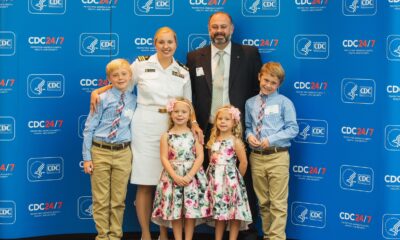Education
The End of an Era: Dr. Mary Kay Murphy’s Final Term on The Gwinnett County Board of Education
Published
1 year agoon
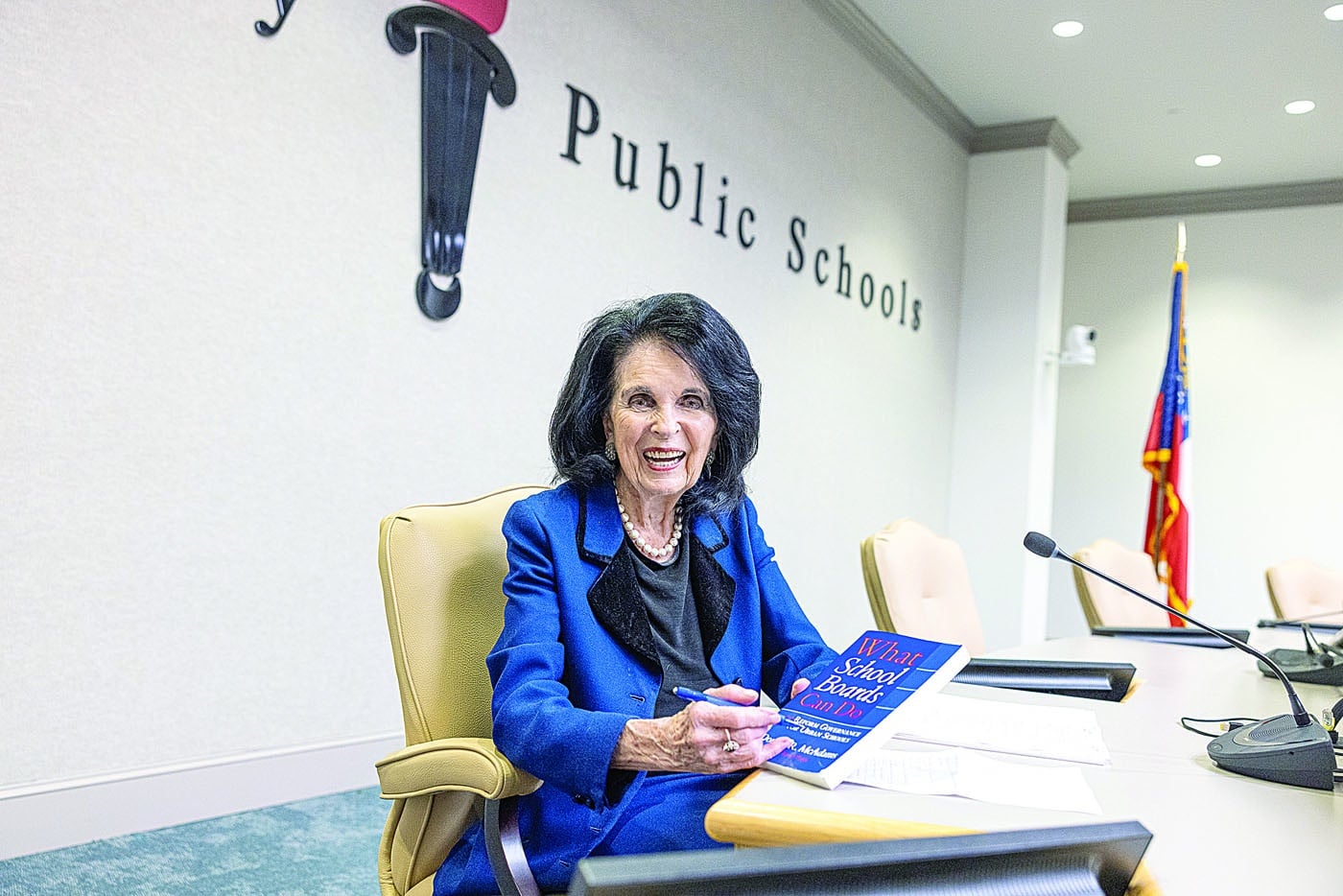
December 31, 2024, will mark the conclusion of the distinguished, seven-term service of Dr. Mary Kay Murphy on the Gwinnett County Board of Education — District III. Until then, Dr. Murphy remains actively engaged and dedicated to the important work of Georgia’s largest school district.
The pivotal role the community plays in identifying thoughtful candidates of ethical conduct could not be better highlighted than by Dr. Murphy’s 28 years on the board.
Reflecting on the impending end of her tenure and her involvement in setting the goals of the school system, which she has relished being a part of Dr. Murphy stated, “I’m sorry it’s coming to an end. There’s an attachment that comes with these experiences. I can’t believe how much I’ve enjoyed it and will miss it.”
An illustrious career
The many important roles Dr. Murphy will cherish include chairing the Gwinnett Board and the Georgia School Board Association, serving on the Seventh District Advisory Committee for local school board governance and the Governor’s Advisory Committee on school boards.
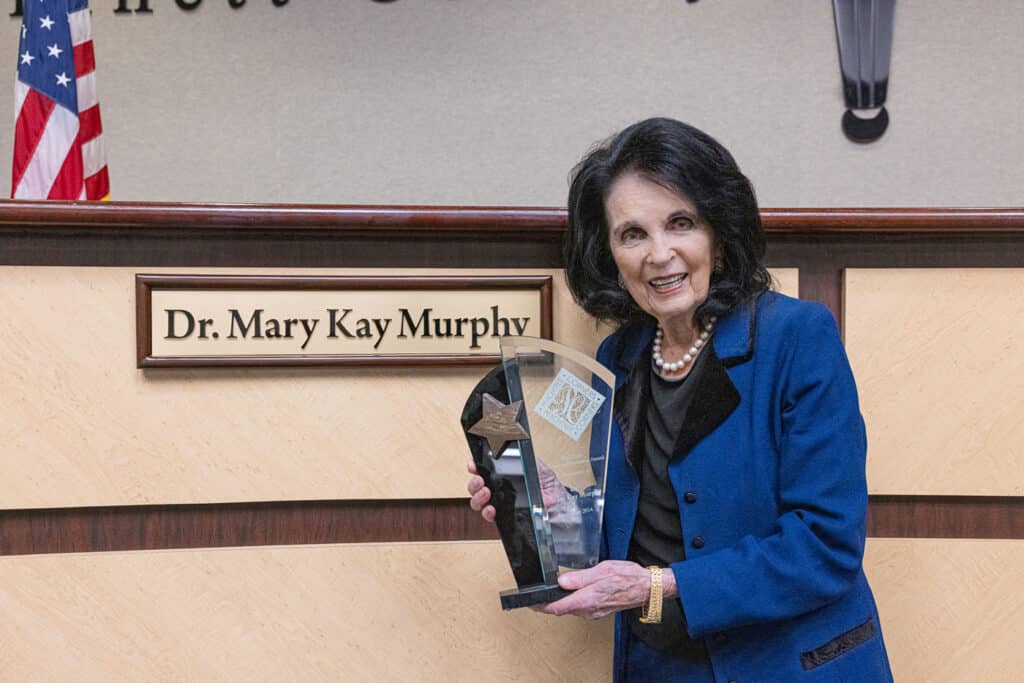
Her multi-faceted career provided valuable insights into public school education and state-level funding, benefiting both rural and urban Georgia. A rather extraordinary woman herself, Dr. Murphy humbly treasures memories of having worked with many remarkable individuals.
Dr. Murphy’s journey began amid fears surrounding the system’s decision to embrace Outcomes Based Education (OBE). OBE is a student-centered learning model which focuses on what students know without relying on rote memorization. As the community geared-up for the 1996 elections, worried citizens rallied to prevent what they felt would be a lowering of academic standards in favor of social promotion, where students might advance to the next grade without meeting proficiency levels.
It was a pressing issue casting a shadow of concern over the future of public education when Dr. Murphy began her first term in January of 1997. She commended the community’s united front, emphasizing their collective concern for the well-being and educational outcomes of all children, not just their own.
A perfect fit
This grassroots movement spurred the need for change and the election of new board members including Dr. Murphy, who shared the community’s vision for a robust and equitable education system. Recalling her entry into the role, Dr. Murphy revealed that initially her husband, Michael Murphy, was the intended candidate due to his extensive legal background.
However, he declined because he wanted to focus on his practice, recommending they consider “someone he knew at home” who’d be perfect. Dr. Murphy stepped into the role, supported by her husband who served as her campaign manager throughout her seven terms. She joked that they had only themselves to blame for nearly three decades of many cold or late dinners.
Dr. Murphy emphasized the importance of honest leadership, with a deep-seated commitment to prioritizing public education. During her initial victory she secured 63% of the vote, underscoring the community’s trust in her capabilities.
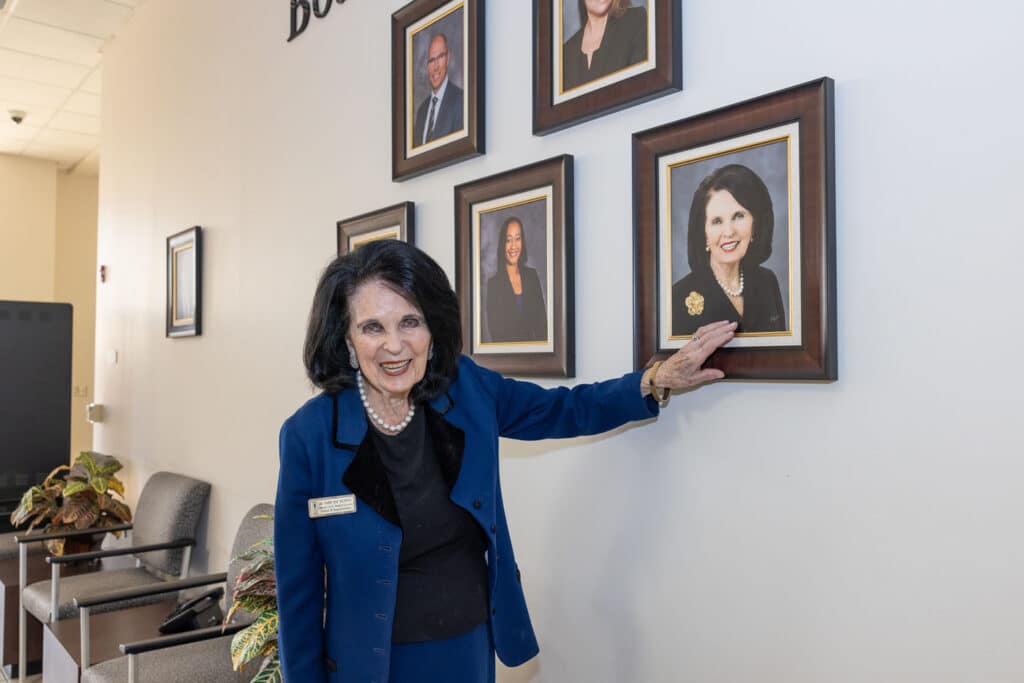
Throughout her tenure, community feedback played a significant role in shaping her decision to seek reelection. Recognizing the value of introducing a fresh perspective to the board is what guided her choice not to seek an eighth term.
Professional highlights
Dr. Murphy values the magnitude of each board member’s role and broader impact. Every vote affects over a million people — residents, students and neighbors — as it applies to the entire county’s population, not just to their respective districts. The responsibility of shaping educational policies and initiatives is one she has always taken very seriously.
According to Dr. Murphy, Gwinnett County found a beacon of hope in Mr. J. Alvin Wilbanks, when the former president of Gwinnett Technical College assumed the role of superintendent. Under 25 years of his leadership, the school system witnessed significant innovations aimed at addressing students’ academic, social, physical and emotional needs.
One of the most notable achievements during Mr. Wilbanks’ tenure was the recognition of Gwinnett County Public Schools (GCPS) by the Broad Foundation as the Best Urban Public School System in the nation in 2010 and 2014. This acknowledgment, accompanied by $1,500,000 in scholarship awards, highlighted the strides made in closing the achievement gap and ensuring educational excellence for all learners.

Academic knowledge and skills
To combat fears of social promotion stemming from OBE, GCPS pioneered the specialized Academic Knowledge and Skills (AKS) curriculum. This approach led to the school system developing its own standards of excellence which many deem to be higher than those set forth by the State of Georgia.
GCPS teachers are required to teach their academic programs incorporating the AKS component of their discipline. Dr. Murphy is proud of the access teachers have to professional development, allowing them to make the AKS curriculum their own.
International Baccalaureate
Dr. Murphy highlighted various initiatives aimed at meeting diverse student needs. Some of the work of which she is most proud includes being present at the onset of the International Baccalaureate (IB) programs offered at Norcross and Shiloh High Schools, Pinckneyville and Summerour Middle Schools, and Peachtree Elementary School.
The IB programs, with globally recognized standards, are designed to be academically rigorous while promoting intercultural understanding, inspiring young minds to work towards a better world. Never has a cross-cultural approach to creating a just and peaceful world been more important than now.
“It took the vote of five and the leadership of the superintendent to bring that to fruition. It also took insight from the community that thought this was a good use of taxpayers’ money,” Dr. Murphy explained.
Dual-Language Immersion
The Dual-Language Immersion (DLI) programs coincide with research — the time to learn a second language is during the formative years of childhood. GCPS’ 50/50 Model means at least 50% of the day is spent learning in the target language.
Trip Elementary School (ES) offers French. Baldwin ES offers Spanish. Students study Korean at Parsons ES. The New Life Academy of Excellence Charter School provides instruction in Mandarin Chinese. Every year it is a leader in student performance.
DLI has been a great investment, in Dr. Murphy’s view. “It’s an amazing thing to see little folks taking on the responsibility and being alert to the benefits of learning a second language,” she shared.
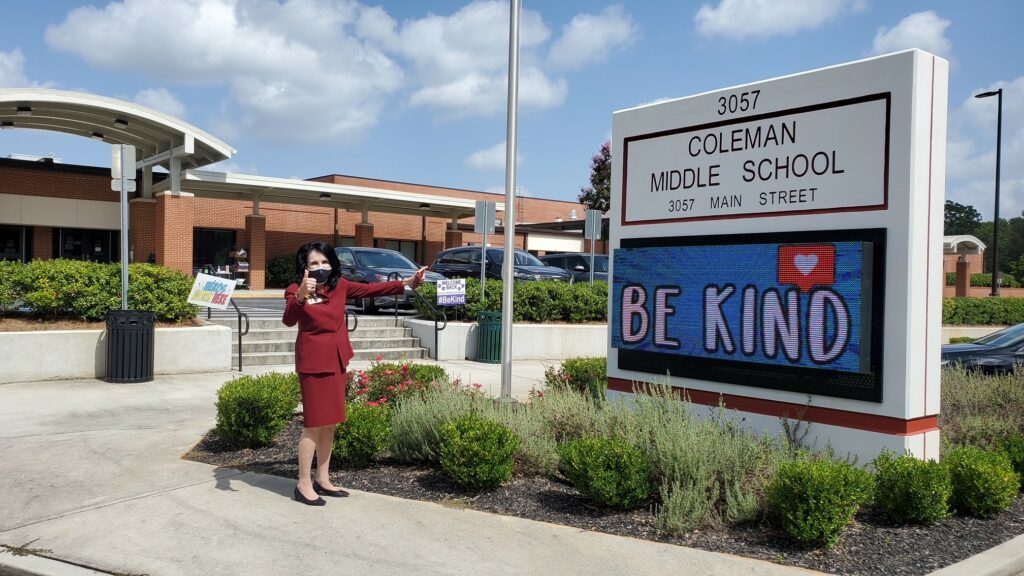
Philanthropy is key in District III
Dr. Murphy lauded the community’s philanthropic efforts, citing the Norcross High School Foundation for Excellence as an exemplary model of parent-led initiatives. Through events like annual galas, the foundation has raised funds to support teacher grants, after-school programs and infrastructure improvements, enriching the educational experience of scholars for over 20 years.
As Dr. Murphy reminisced about her own experience as a board member, she underscored the profound impact of community engagement and collaboration in shaping the trajectory of public education in Gwinnett County. Through shared vision, advocacy and tireless dedication, stakeholders have transformed challenges into opportunities, ensuring that every child receives a quality education and the support needed to thrive in an ever-changing world.
Many parents participate in the good works of local schools by donating their time and talents even after their kids have gone to college. “It’s been an amazing thing to see their spirit of philanthropy continue,” Dr. Murphy remarked.
“I think District III is in extremely good shape. We’ve got tremendous principals, community members who truly care about these schools and a variety of schools to meet student needs,” she observed.
SPLOST
According to Dr. Murphy, the Special Purpose Local Option Sales Tax (SPLOST) has greatly enhanced school system facilities. The community’s unwavering support for SPLOST referendums has enabled rapid growth and expansion through the construction of 76 new schools since 1997. Norcross High School, funded in part by SPLOST revenues, stands as a testament to the community’s commitment to investing in public education infrastructure.
Under the leadership of the Superintendent, the board works to balance the yearly budget, thereby steering the course of property taxes and allocations. Dr. Murphy revealed this year’s budget to be approximately $2.8 billion dollars and was happy to announce the 19.2 school millage rate would remain the same.
“Even though some of our housing properties have increased in value, our millage rate will not increase. We’ve been able to keep it steady for almost seven years,” Dr. Murphy shared.
The Great Recession
During the economic downfall of 2008, Governor Nathan Deal’s Austerity Cuts included $100,000,000 out of the state budget for public education. Dr. Murphy is proud that GCPS, through the leadership of the superintendent and his staff, made certain that teachers were able to keep 190-day contracts.
“This did not happen in many school systems, where the funding of the property tax would not allow for it. We saw teachers’ salaries cut to 140 days,” Dr. Murphy said.
Extra large
It’s difficult to fathom the logistics of the largest school district in Georgia — the 11th largest in the U.S. GCPS includes 144 schools. When Dr. Murphy first started there were nine schools in District III. Today, her district comprises 30 schools.
Calling attention to the remarkable high schools, some of the largest in the country including Norcross, Duluth, Peachtree Ridge, North Gwinnett and Paul Duke STEM, Dr. Murphy celebrates the options available to students.
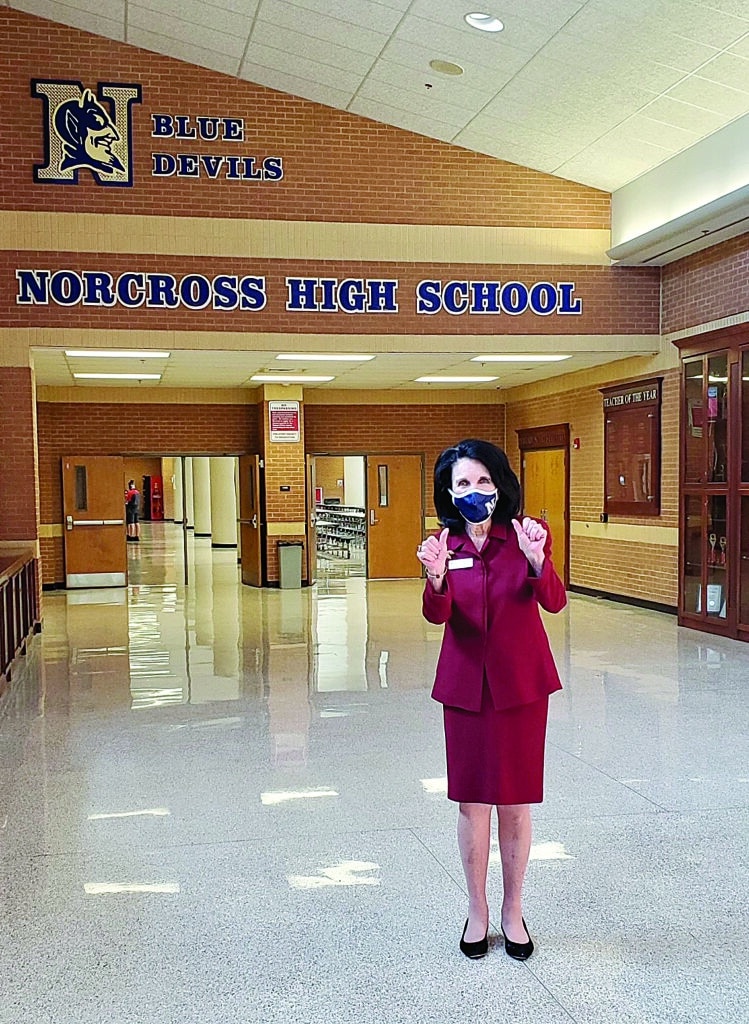
“The Norcross cluster was the first to provide two high schools for students so that they and their parents could have an opportunity for school choice. That took place approximately five years ago, when Paul Duke opened,” Dr. Murphy beamed.
Paul Duke
Paul Duke STEM High School on Peachtree Industrial Boulevard was named after the Georgia Tech graduate who founded Peachtree Corners. Dr. Murphy recalled the day of dedication with an auditorium bursting at the seams with Duke’s Georgia Tech colleagues and people who built Peachtree Corners.
Opening two high schools was the solution as Norcross could no longer increase its enrollment to accommodate the rampant growth in District III. Norcross High School maintained its important niche with the IB program from kindergarten through senior year.
Paul Duke became a Science, Technology, Engineering and Mathematics (STEM) school — in keeping with the purpose behind the founding of Peachtree Corners — to provide technology jobs that would keep Georgia Tech graduates and engineers from moving out of state.
The GIVE Center West
Just down the street from Paul Duke is an alternative school, The GIVE Center West or Gwinnett Intervention Education serving grades 6 through 12. It aims to prepare students for graduation and transition back to their home school if they wish, with improved academic and behavioral skills.
Academics and the arts
Since 2014, The North Metro Academy of Performing Arts has brought a new dimension for elementary school families craving something beyond the standard curriculum by integrating it with the performing arts. Instruction at North Metro fosters collaboration, imagination and confidence.
They can’t all be golden
One regret Dr. Murphy expressed was the board’s unfortunate 2023 decision to change the GCPS discipline policy. She readily admits that she initially went along with it believing teachers and principals would receive the professional development needed to make Restorative Justice work with students.
Restorative Justice is defined by Dr. Murphy as a commitment to the relaxation of the initiatives that would punish a student for behavior. “The relaxation was felt from the top of the organization to the bottom. We had unbelievable student unrest, students fighting one another, bringing weapons to school, losing their mooring, basically,” Dr. Murphy recounted.
The aim of Restorative Justice is to have students understand their inappropriate behavior and be self-motivated to change it. A restructuring of student relationships with teachers and counselors is a component of the lighter discipline model.
As a former teacher, I could not refrain from wondering aloud, “How did this happen?” I learned it was the election promise of some board members.
“Elections have consequences,” Dr. Murphy warned. Not far into the process, Dr. Murphy rescinded her vote to support the change in discipline and insisted on a mid-course correction.
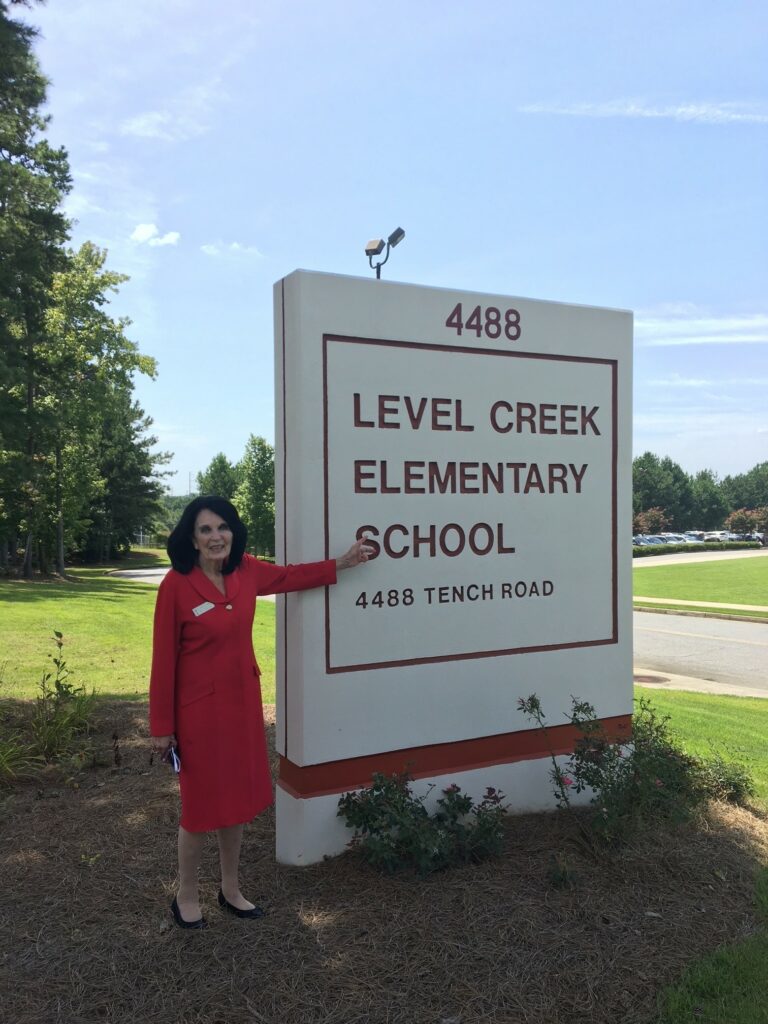
New leadership
Crediting Superintendent Dr. Calvin Watts for finding a pathway, Dr. Murphy believes things are moving in the right direction now. “It was a hard lesson and I’m confident our board has learned from it,” she stated.
After Mr. Wilbanks was Superintendent for 25 years, Dr. Watts has risen to meet the challenge of managing both changes and stability.
Yet she remains positive and hopeful about what the coming months will bring.
“There’s an awareness and we have every benefit of some awfully good minds. If there’s one thing we have, it’s a lot of brain power throughout 183,000 students and 25,000 teachers and principals,” Dr. Murphy remarked.
Funding
A generous allotment of federal money, approximately $1,000,000,000, was contributed to the school system by the federal government with the stipulation that it must be spent by September 2024. The money has been instrumental in easing students back into school after extended absences due to COVID.
“It has helped us employ counselors in larger numbers than we’ve had before, social workers, people who can help us face the challenges from COVID. With budget season ahead, the board is now challenged with providing those services without federal funding,” Dr. Murphy said.
Continuous improvement
While school board members are evaluated at the ballot box, as Dr. Murphy pointed out, principals and teachers are evaluated by parents and their students. Dr. Murphy feels the online evaluations provide meaningful feedback.
Weekend warrior
Aside from her day job, Dr. Murphy spent three years traveling in the name of institutional advancement. Fulfilling her role as adjunct professor was important to her. Traveling to Nashville on weekends, Dr. Murphy taught English at Vanderbilt University’s Peabody College. For three additional years she did the same at LaGrange College near Columbus, Ga.
At Vanderbilt Dr. Murphy had about 15 students from all over the country keeping the same weekend schedule. Directing the programs at both colleges, she was glad to follow her students over the course of their three-year programs.
After her final term
After wrapping-up her school board endeavors on December 31, 2024, you can find Dr. Murphy enriching the community from the board of The Georgia Humanities Council.
Championing the humanities, which have added value to the lives of so many besides her own family, Dr. Murphy shared, “The humanities have a historic role to play in creating critical thinkers engaged in community life. I’m looking forward to being a part of this organization and meeting people from all over the state. I’m thinking how appreciative I am of the humanities teachers and professors in GCPS and in the state.”
With her husband, Dr. Murphy looks forward to creating memories and spending quality time with their 11-year-old twin grandchildren — one boy and one girl. They’ll be cheering for them on the baseball field and basketball court.
In the same breath that she expressed the desire not to get too regimented, Dr. Murphy confided, “There’s nothing like a good project to work on.”
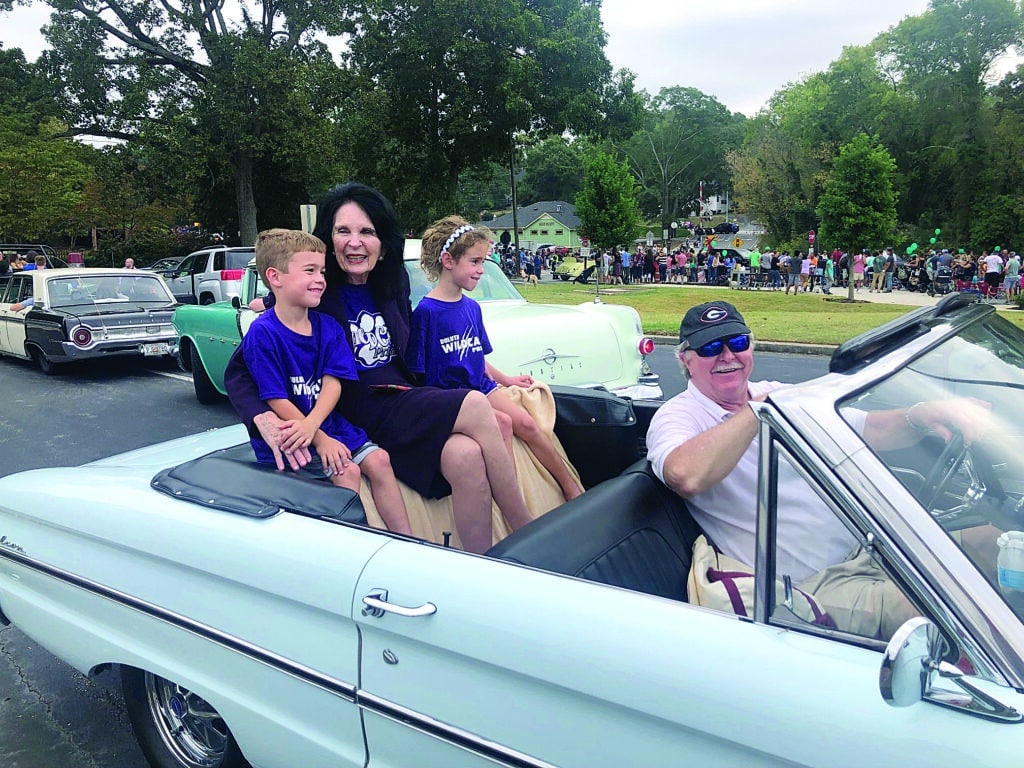
A lasting impact
Despite her decision to step down, Dr. Murphy remains steadfast in her dedication to education, acknowledging that the work is far from finished. Looking back on her impactful career, she expressed gratitude for the opportunity to serve her community through the advancement of public education.
Although she’s been recognized in many ways for her steadfast service, two awards hold special meaning for her: the Paul Duke Lifetime Achievement in Education award and the Boy Scout award.
Dr. Murphy concluded, “I’ll always have a great place in my heart for the work on the Gwinnett County Board of Education. It’s given me so much joy and a sense of continuity. There’s always something to learn and it’s important to remember to bring others along.” Preparing to pass the baton to a new generation of leaders, Dr. Murphy’s legacy of integrity, dedication and passion for education will undoubtedly leave a lasting imprint on the Gwinnett County School System.
Find more Peachtree corners education stories here.
Related
Patrizia hails from Toronto, Canada where she earned an Honors B.A. in French and Italian studies at York University, and a B.Ed. at the University of Toronto. This trilingual former French teacher has called Georgia home since 1998. She and her family have enjoyed living, working and playing in Peachtree Corners since 2013.

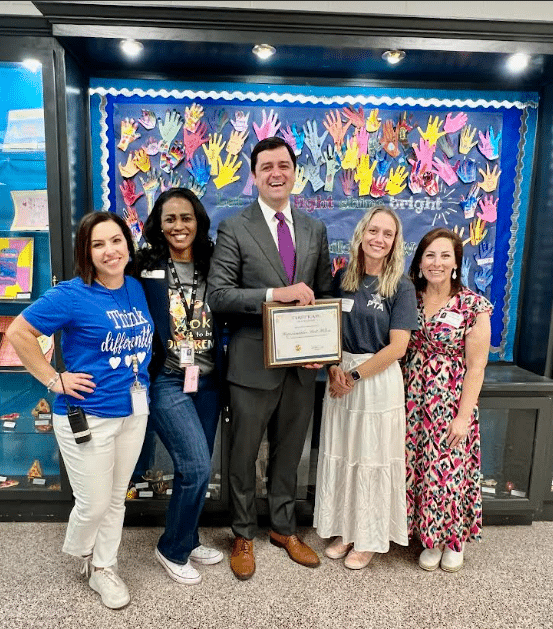
Simpson Elementary School celebrated Exceptional Children’s Week (ECW) last month with five days of special activities to recognize their special needs population and all of their exceptional students.
April 14–18 is set aside each year to celebrate children with disabilities, gifts and talents. This year’s ECW theme was Bridging Gaps and Building Futures, and the school was happy to take part.
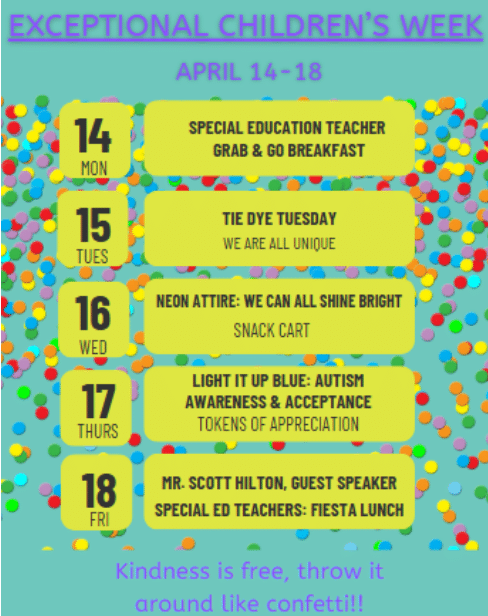

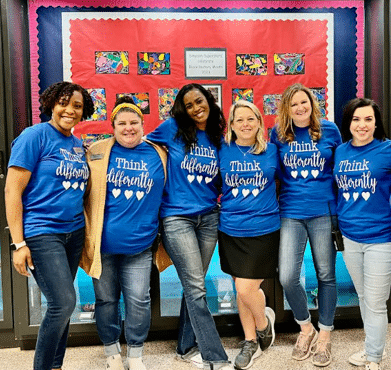
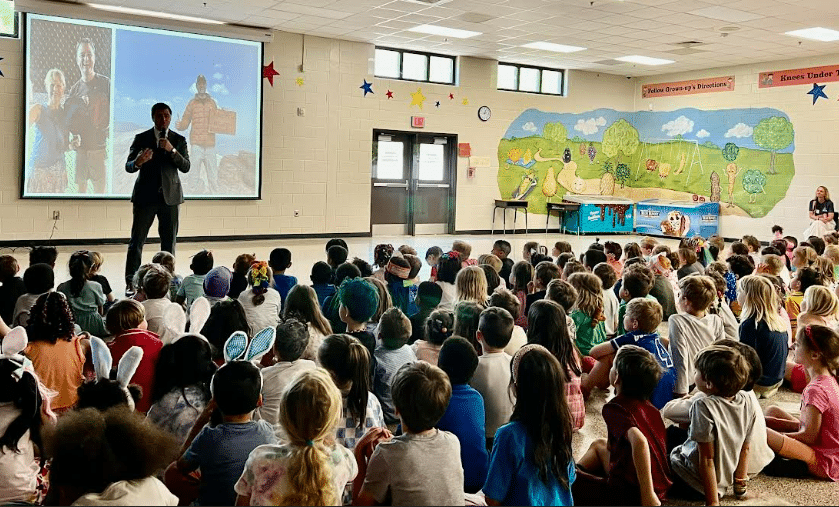
They highlighted each day of the week on the morning news with fun facts about notable people in society — and throughout history — who have overcome challenges with their disabilities, including actor Daniel Radcliffe (who has lived with dyspraxia for his entire life), Tom Cruise, Whoopi Goldberg, Frida Kahlo and Helen Keller.
Simpson Elementary’s technology team also pre-recorded various special needs classes reciting the Pledge of Allegiance every day of the week.
Guest speaker
To end their ECW with a bang, they invited former Simpson Elementary parent, State Representative Scott Hilton, to come in and speak to their K-2 classes about raising his son, Chase (who is autistic and now a student at Norcross High School), and how being different is okay.
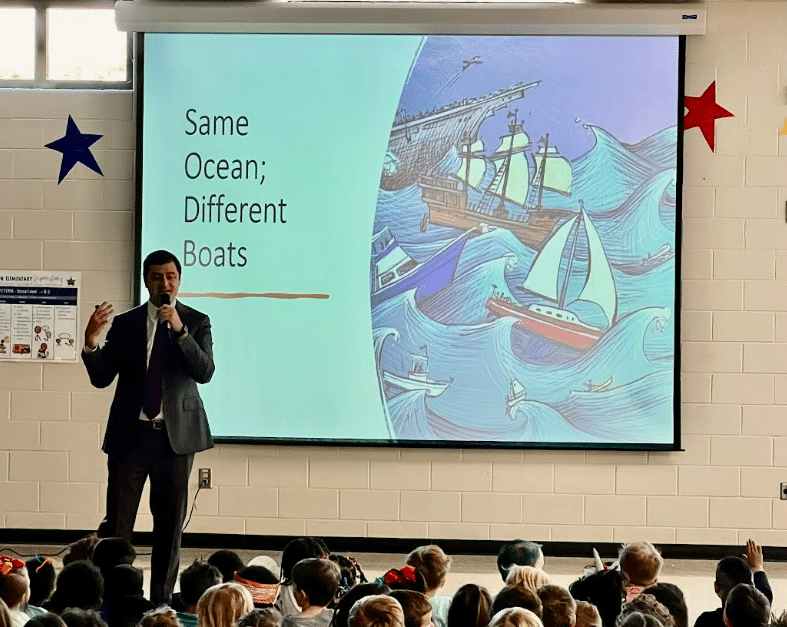
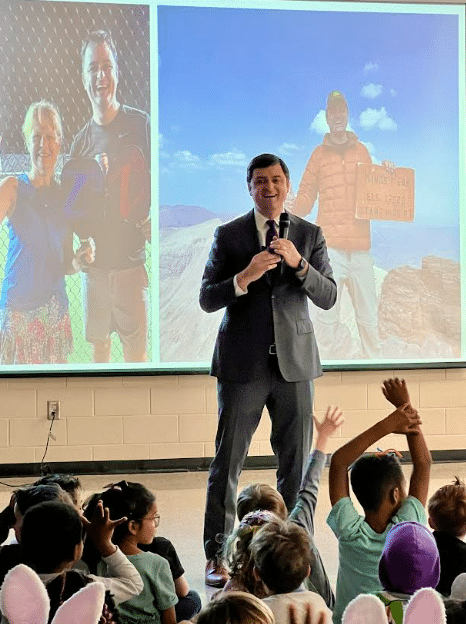
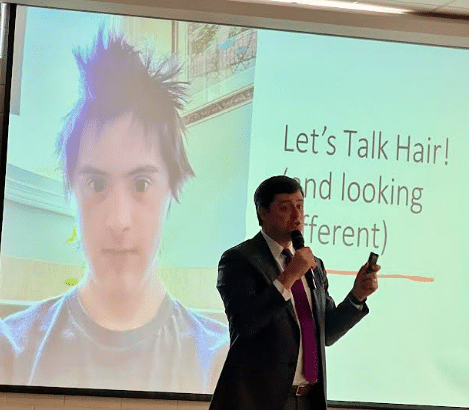
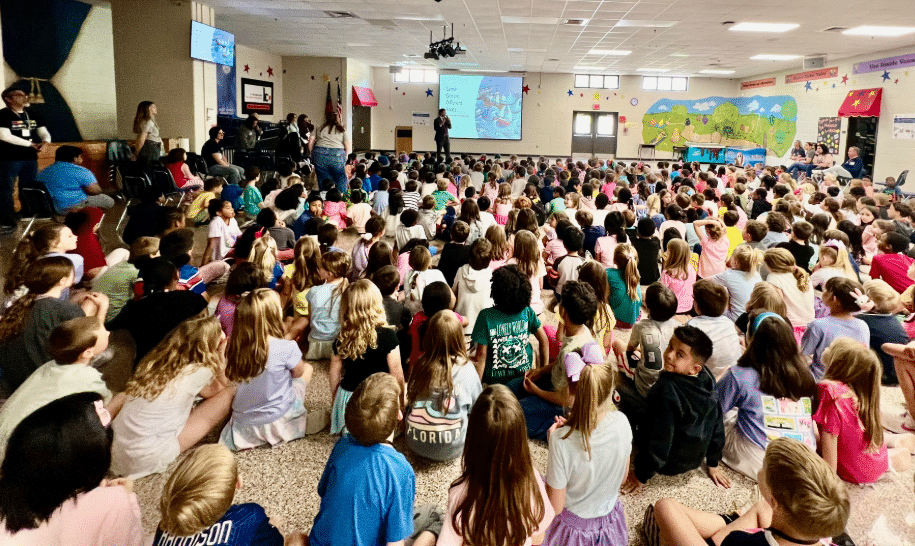
“Showing kindness and being inclusive is the best version of humanity,” said Dr. Taffeta Connery, Simpson Elementary School principal, in a statement about the event.
“Simpson Elementary has a special needs population of 214 (23%) of 946 students. [And] … we strive to ensure that our students are valued, recognized and instilled with high expectations for all.”
For more about Simpson Elementary, visit simpsones.gcpsk12.org.
Related
Education
Paul Duke STEM High School Student Earns CGO Scholarship
Published
7 days agoon
May 2, 2025
Cobb Global Outreach Inc. (CGO Inc.), a non-profit organization dedicated to enhancing financial literacy and educational opportunities, recently awarded three scholarships to metro Atlanta high school seniors, including one to Paul Duke STEM student, Baylor M. Brown.
The scholarship initiative underscores CGO Inc.’s commitment to empowering youth through financial education and support.
According to CGO’s social media pages, these outstanding students have shown incredible dedication and resilience in their academic journeys. “We are proud to support their continued success and look forward to seeing all that they will achieve!”
Scholarship details and impact
The scholarships provided by CGO Inc. are designed to alleviate financial barriers and encourage academic excellence among students pursuing higher education. Each scholarship recipient will receive financial assistance to support their educational endeavors, along with resources to enhance their understanding of financial management and literacy.
The scholarship recipients have demonstrated remarkable potential and a strong commitment to making a positive impact in their local community and beyond.
Bobby Cobb, CEO and founder of Cobb Global Outreach Inc., expressed enthusiasm about the partnership, stating, “We are honored to support the students … . By investing in their education and financial literacy, we aim to equip them with the skills necessary for a successful and financially secure future.”
Looking ahead
Cobb Global Outreach Inc. remains committed to expanding its scholarship programs and financial literacy initiatives. The organization plans to collaborate with additional schools and community partners to further its mission of closing the wealth gap and fostering economic empowerment among youth.
About Cobb Global Outreach Inc.
Founded in January 2021, Cobb Global Outreach Inc. is dedicated to educating middle and high school students about financial literacy. The organization believes that providing students with tools and resources related to financial literacy will help narrow the wealth gap and promote economic empowerment.
For more information, visit cobbglobaloutreachinc.com.
Related
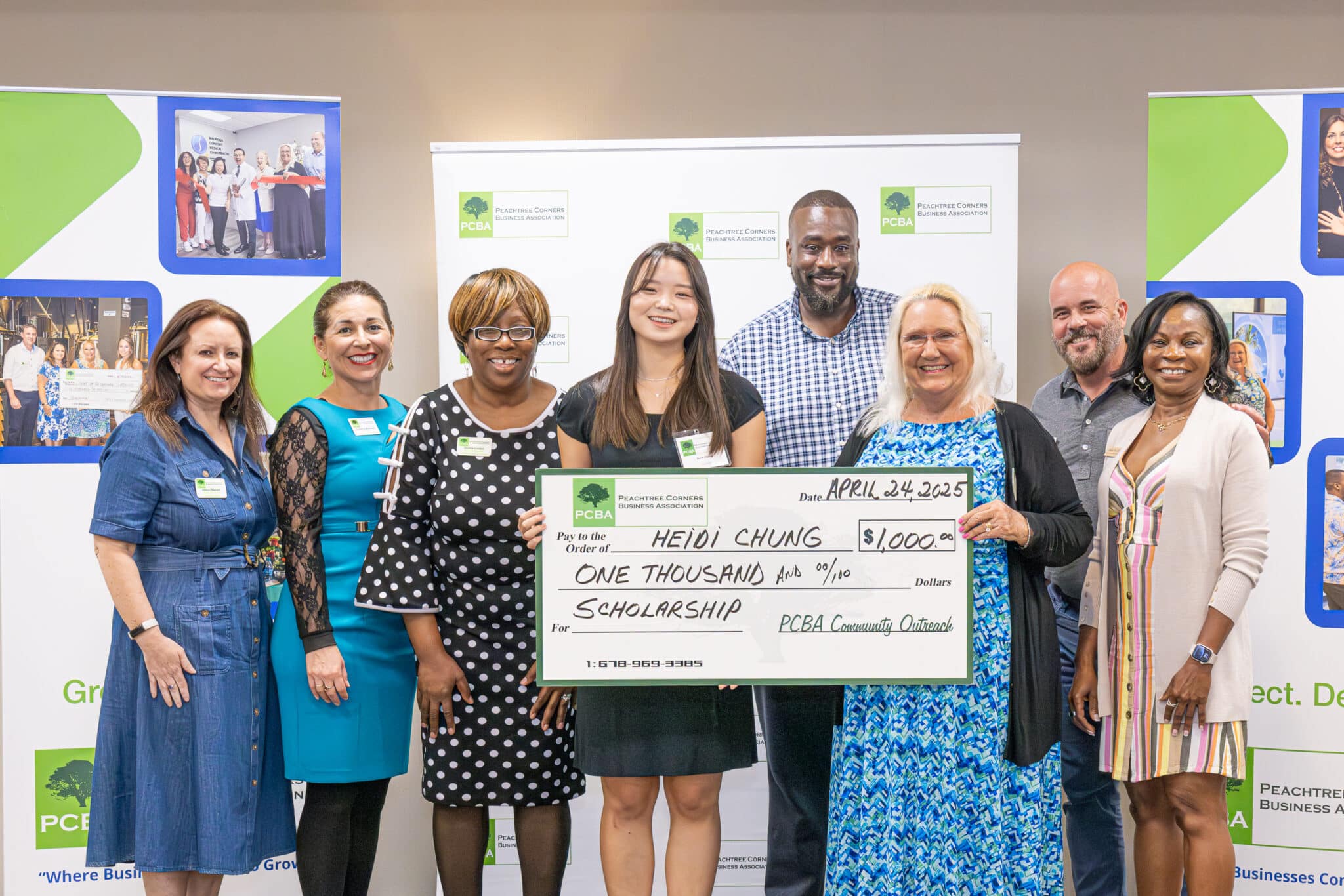
The Peachtree Corners Business Association (PCBA) awarded local high school senior, Heidi Chung, a $1,000 scholarship during their April 24 Business After Hours event. Heidi and her family were presented with the scholarship and introduced to the organization’s members and guests at the monthly gathering.
Heidi was accepted by several colleges and has selected the University of Kentucky to continue her education, pursuing a degree in nursing. When asked what lessons she has learned from her experiences volunteering and serving in the community throughout her life, Heidi commented, “I have learned that true leadership is about service, taking initiative and persevering through challenges.”
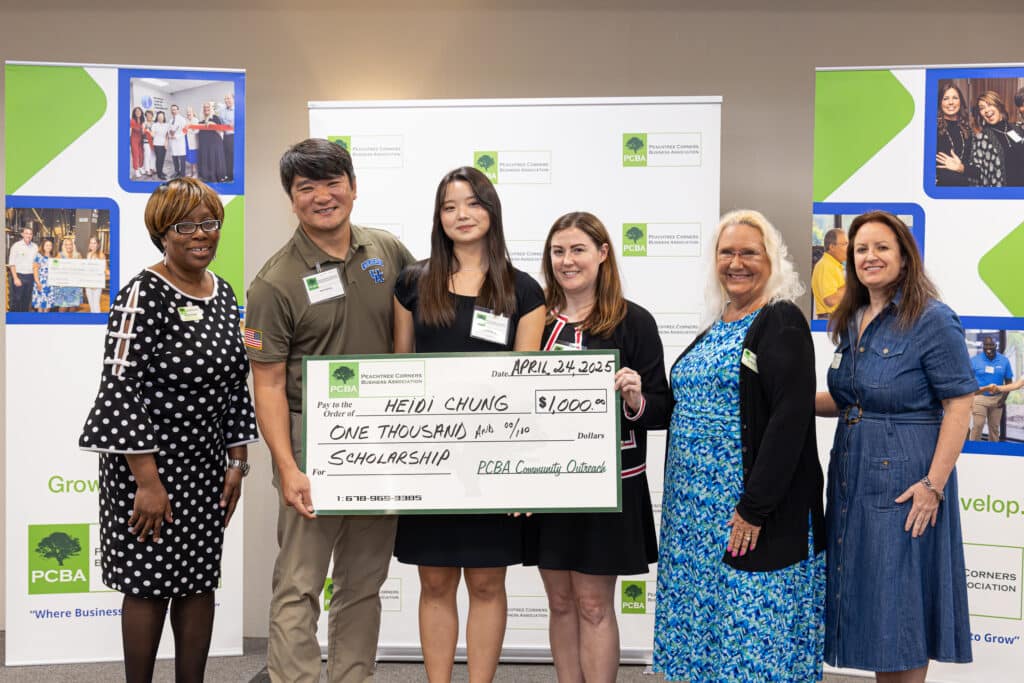
Scholarship Chair Donna Linden and Outreach Director Suzanna Martinez shared that the scholarship committee was impressed with Heidi’s many accomplishments, “whether she was organizing fundraisers, leading performance groups or helping athletes recover from injuries, Heidi demonstrated a positive impact on the community, as well as outstanding academic results.”
Funds for the PCBA Community Outreach Program are raised throughout the year from PCBA membership, sponsorship and an annual charity event. Donations and scholarships are awarded at PCBA’s monthly events so that members have the opportunity to learn more about the individuals and organizations.
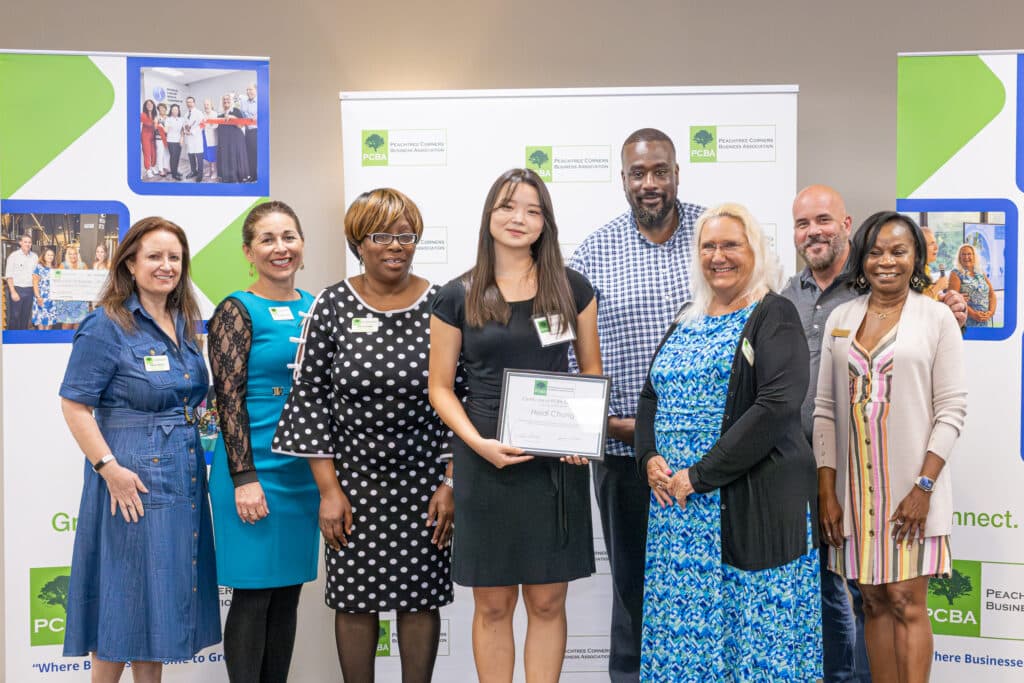
“We are so proud that the PCBA has … awarded 20 scholarships to outstanding future business leaders and donated in excess of $173,000 into our metro Atlanta community over the last 13 years,” stated Lisa Proctor, PCBA board president.
About Peachtree Corners Business Association
“Where Businesses Come to Grow,” the Peachtree Corners Business Association is a business membership organization that focuses on innovative approaches, programs, shared resources, community outreach and opportunities for member businesses and professionals to connect, develop, grow and prosper.
The PCBA is made up of businesses of all sizes and types who want to expand their reach and grow their business within Peachtree Corners and the greater metro Atlanta area.
For more information, call 678-969-3385, email membership@peachtreecornersba.com or visit peachtreecornersba.com.
Related
Read the Digital Edition
Subscribe
Keep Up With Peachtree Corners News
Join our mailing list to receive the latest news and updates from our team.
You have Successfully Subscribed!

GA Tech Launches First-of-its-Kind GT Atrium in Peachtree Corners

Katherine Lafourcade — A Journey of Passion, Resilience and Giving Back

Digital Edition

PCBA Announces 2025 Scholarship Winner

Paul Duke STEM High School Student Earns CGO Scholarship

World Blood Donor Day Starts Here: Theo’s Miracle, Katherine’s Mission [Podcast]

Peachtree Corners Grows Business Opportunities Through Economic Development

Executive Function: A Tribute to Working Moms

Simpson Elementary Marks Exceptional Children’s Week

Executive Function: A Tribute to Working Moms

Official City Merchandise Line Debuts This Saturday at Town Green

Peachtree Corners Grows Business Opportunities Through Economic Development

Digital Edition

World Blood Donor Day Starts Here: Theo’s Miracle, Katherine’s Mission [Podcast]

Paul Duke STEM High School Student Earns CGO Scholarship

PCBA Announces 2025 Scholarship Winner

Light up the Corners [Video]

Capitalist Sage: Business Leadership in Your Community [Podcast]

Cliff Bramble: A Culinary Adventure through Italy

Top 10 Brunch Places in Gwinnett County

A Hunger for Hospitality

THE CORNERS EPISODE 3 – BLAXICAN PART 1

Top 10 Indoor Things To Do This Winter

The ED Hour: What it takes to Remove Barriers from Education

Peachtree Corners Life
Topics and Categories
Trending
-
Digital Edition4 days ago
Digital Edition
-
Podcast4 days ago
World Blood Donor Day Starts Here: Theo’s Miracle, Katherine’s Mission [Podcast]
-
Business3 days ago
Peachtree Corners Grows Business Opportunities Through Economic Development
-
Community2 days ago
Executive Function: A Tribute to Working Moms







